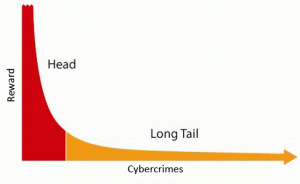Archive for February 17th, 2010
The Criminology and Economic incentives behind Cybercrimes no comments
The prevailing assumption of cybercrime is that it is a massive threat that could cause unimaginable chaos to society. However, this is just a virtual threat. The reality is that cybercrimes most often involve small impact bulk victimisations which can be individually insignificant but collectively significant. Most cybercriminals target the long tail of crime where they prefer to commit more crimes with less gain. An example of that would be a cybercriminal scamming 50 million people for £1.

Such a model of crime has several advantages over traditional models of crime as individually insignificant amount of losses means:
1. Victims would be less bothered about reporting the crime
2. Police less likely to get involved
3. Credit card companies less bothered
For more information, please see the presentation on “Organized Crime and the Organization of Cybercrime” given by David Wall.
The study of cybercrime requires a multidisciplinary approach as the society is affected. Economics, law, sociology, psychology and criminology are just some of the disciplines involved. It is my intention to understand cybercrimes from the economics and criminology perspective so that I can have a better understanding on why cybercrimes occur.
Economics
After reading the presentation on “How Economics and Information Security Affects Cyber Crime and What This Means in the Context of a Global Recession” given by Peter Guerra, I believe that by understanding more about the economic incentives behind cybercrime, that is, the incentives to commit crime and the incentives to protect from crime, I would gain a better understanding of the rationale behind cybercrimes and whether critical points can be identified using economic theories.
The economic books which I’m proposing to read are:
- Microeconomics: Principles and analysis by F.A. Cowell
- Economics (6th Ed) by J. Sloman
Criminology
Criminology is the study of crimes and by studying criminology, I’m looking to develop an understanding on the theories in criminology and an imaginative mind on crimes so that not only I can understand why crimes occur but can also anticipate when and where crime is likely to occur. There are three textbooks I’ve found which are relevant:
- Criminology: The Basics by Sandra Walklate
- The Oxford Handbook of Criminology by Mike Maguire, Rod Morgan, and Robert Reiner
- Cybercrime: The Transformation of Crime in the Information Age by David S. Wall
- Handbook of Internet Crime by Yvonne Jewkes and Majid Yar
Independent Disciplinary Review no comments
The Introduction
Trust is hugely important. In our everyday lives we put a huge amount of trust in other people as we simply cannot do all of the things that we have to do to be able to get by. We depend on doctors to help us out with medical issues because we do not know everything about medicine to be able to treat ourselves; we put our trust in them. The same happens in the case of teaching, our finances and basically everything that we do. As we now begin to spend more and more of our time online; from shopping to socialising with friends to the rest, the trust that we have in the physical world now has to move with us into the virtual one.
In the real world we can however at least see the person we are interacting with and whilst we put our trust in that person who claims to be a gas inspector and let them into our house on the basis of no more than a badge, we have a security blanket in place in that we are at least there to monitor. In the online world however you cannot see that person and so trust takes on a different perception. What drives the trust that we put in others when online is really interesting and something that I am going to be examining from sociological and psychological points of view.
Sociology is the study of society; refinement of the body of knowledge in respect of human activity. Psychology by contract looks at the human and his mental functions and operations. The two really work well with one another and complement one another as one hand you have the stud of the individual and his perceptions and what drive him and then subsequently an examination of society as a whole and what drives it.
The core texts in the disciplines will allow me to understand how the two view the issue of trust and in turn allow me to explore how these relate to the Web; why we adopt the notions that we do in respect of trusting people online as an individual and as a society.
References
Sociology
- ‘Introductory Sociology’ – Bilton, Bonnett, Jones, Lawson, Skinner, Stanworth & Webster
- ‘Thinking Sociologically’ – Bauman
- ‘A New Introduction to Sociology’ – O’Donnell.
- ‘An Introduction to Political Sociology’ – Rush
Psychology
- ‘Fundamentals of Human Neuropsychology’ – Kolb & Whishaw
- ‘ Psychology: The Science of the Mind and Behaviour’ – Gross
- ‘Psychology: An Introduction’ – Hayes & Orrell